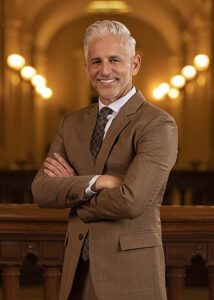By Ryan Sabalow
CalMatters


SACRAMENTO — In response to his daughter receiving a swastika on social media, a California Jewish lawmaker is pushing for a bill that would give school administrators authority to suspend or expel students if they cyberbully fellow students away from school and outside of school hours.
But Long Beach Assemblymember Josh Lowenthal’s Assembly Bill 2351 is coming into conflict with California’s recent reforms intended to prevent students of color from being expelled and suspended at disproportionate rates.
The ACLU and other social justice organizations oppose Lowenthal’s bill. The bill’s critics told the Assembly Education Committee earlier this month at the bill’s first hearing that giving school administrators authority to punish students for behavior that occurs off campus could result in the return of “racially biased and disparate” punishment that puts students on a “school-to-prison pipeline.”
Lowenthal told the committee that as a socially-conscious Democrat, he previously couldn’t “imagine a scenario where I’m on a different side” from the ACLU, but he said his daughter’s experience highlighted why the law needs to change.
“Only a decade ago, school bullying ended once you got home and were safe,” he said. “Today, many of these activities are now taking place online, off campus, in the digital ether, and outside regular school hours, and there is nowhere and no time that our kids are truly safe.”
Lowenthal told the committee that administrators at his daughter’s middle school told him they didn’t have authority to expel the student who sent his daughter a swastika on the online messaging app Snapchat. He said the school lacks authority to police off-campus activity and her school was following a “legal interpretation of how the law is written” that places an emphasis on “restorative justice” instead of punitive actions such as suspensions.
According to the bill analysis, “The trend in recent years, in California as well as nationally, has been to reduce the rates of suspension and expulsion (following) a large body of research (that) has identified adverse impacts,” including disproportionate rates for students of color.
For instance, the California Department of Education told school administrators in a 2021 memo that African American students made up 5.4% of public school students in California but comprised 15% of students who were suspended the previous year.
The memo noted that research has shown the rate of suspension is not because Black kids behave worse; rather it is because they receive harsher treatment for minor offenses such as talking in class and other nonviolent behavior.
“Suspension can do more harm than good,” the memo noted. “Sending a student home from school does not address the root cause of a student’s behavior; it removes students from the learning environment; and it has a disproportionate impact on African American students and students with disabilities, among other marginalized groups that are underperforming academically and overrepresented in our criminal justice system.”
After years of policy changes, suspension is now used as a last resort in California. Total suspensions in California have dropped 58% in the 10 years prior to 2022, according to the bill analysis.
Lowenthal said district officials also told him that since the bullying his daughter received was after school and not on campus, there was nothing the school could do. Police told him the incident didn’t rise to the level of a hate crime so they were left to choose whether to pull their child from school.
“We had to consider, as a family, leaving the school,” he said. “And so the victims are the ones who are actually punished in this situation.
He told the committee the bill is a priority of the Legislative Jewish Caucus, of which he’s a member.
“The reason this rises to the level of a Jewish Caucus priority bill is the rise in antisemitism and the rise in Islamophobia that we’re seeing on school campuses,” said Assemblymember Dawn Addis, a member of the Jewish caucus and one of the five education committee members to vote for the bill.
Lowenthal didn’t say at the hearing when the student sent his daughter the swastika and he didn’t identify the school district or if the family changed schools. His office did not return messages seeking comment. The bill, which will next be heard in the Assembly Judiciary Committee, advanced over the objections of two Democrats, David Alvarez of Chula Vista who abstained and Mia Bonta of Oakland who cast the lone “no” vote.
Bonta said her seventh-grade daughter’s life was “completely transformed because she was cyberbullied.” Like Lowenthal, she said the Bonta family learned the school district couldn’t do anything about the bullying because it happened after school hours. Bonta’s husband is Attorney General Rob Bonta.
But Mia Bonta said she felt Lowenthal’s proposed legislation goes too far and reaches “into the lives of children outside of the school campus.” Aside from cyberbullying, she noted that the bill includes a host of other reasons an administrator can suspend or expel students for after-hours and off-campus misdeeds, including possessing tobacco, theft and if they’re committing an “obscene act or engaged in habitual profanity or vulgarity.”
“And that, for me, is the quintessential definition of contributing to the school-to-prison pipeline,” Bonta said.
*
Republished from CalMatters, which is a nonpartisan and nonprofit news organization dedicated to covering America’s biggest state, 39 million Californians and the world’s fifth largest economy.